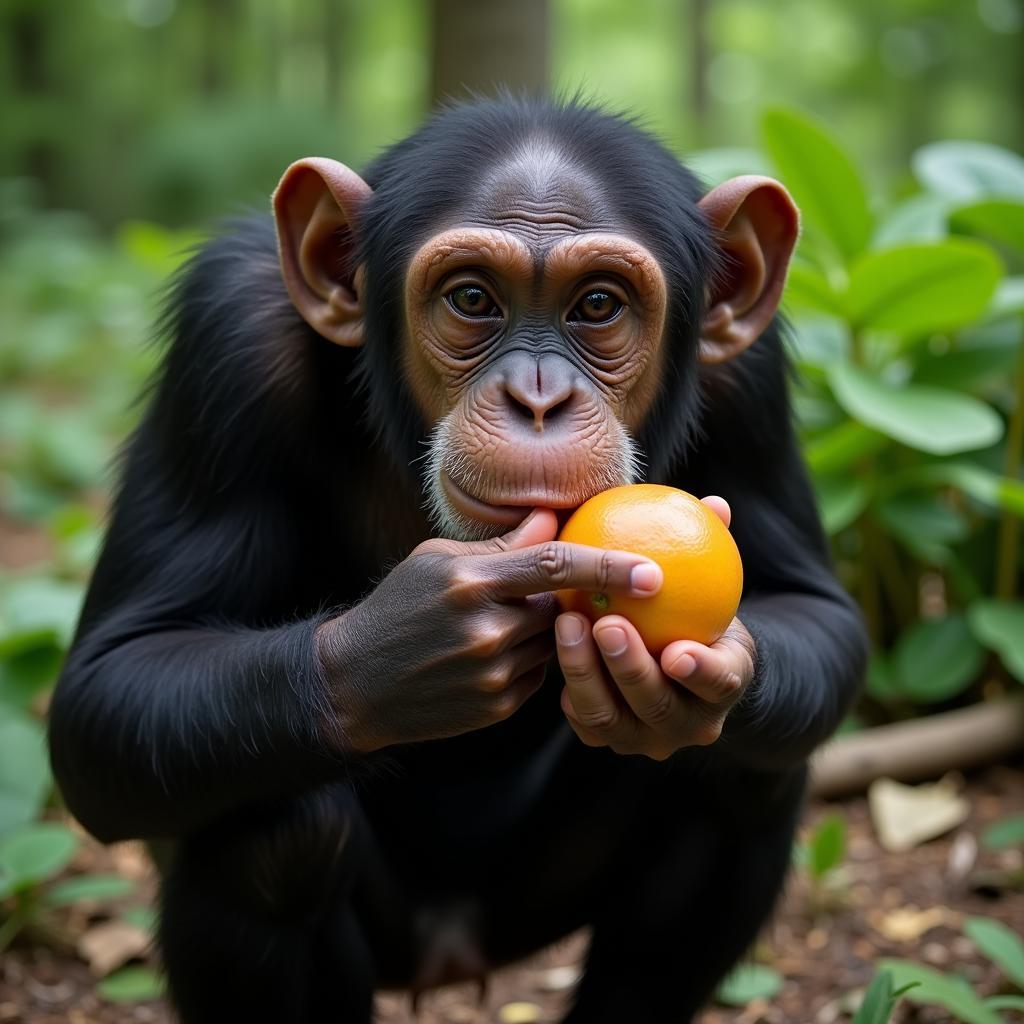Fascinating African Chimpanzee Facts
African Chimpanzee Facts reveal a captivating world of intelligence, social complexity, and surprising similarities to humans. These remarkable primates, inhabiting the forests and woodlands of equatorial Africa, offer a glimpse into our own evolutionary past and raise crucial questions about conservation and our shared future. Learn more about these incredible creatures, their habits, and the threats they face.
Unveiling the Secrets of African Chimpanzees
Chimpanzees, our closest living relatives, share a remarkable 98.7% of our DNA. This genetic proximity translates into a range of fascinating behaviors and cognitive abilities. From their complex social structures to their innovative use of tools, African chimpanzees continuously surprise and inspire researchers. They demonstrate a deep understanding of their environment, utilizing various plants for medicinal purposes and displaying sophisticated communication skills. For instance, different chimpanzee communities have distinct vocalizations and gestures, almost like regional dialects. Check out this fascinating african rainforest article to understand more about their habitat.
The Social Lives of African Chimpanzees
Chimpanzee society is a complex web of alliances, rivalries, and family bonds. Led by an alpha male, these communities can range from a few dozen to over a hundred individuals. Within these groups, chimpanzees engage in a variety of social interactions, from grooming and playing to displays of dominance and aggression. These interactions shape their social hierarchy and influence their access to resources like food and mates. Their social intelligence is truly remarkable, with individuals forming strategic alliances and exhibiting empathy towards other members of their group.
What Do African Chimpanzees Eat?
African chimpanzees are primarily frugivores, meaning their diet consists mainly of fruit. However, they are also opportunistic omnivores, supplementing their diet with leaves, insects, nuts, seeds, and occasionally meat. They’ve been observed hunting small mammals, like monkeys and bushpigs, showcasing their adaptability and resourcefulness. You can explore more african animal facts for kids to learn about other African species and their dietary habits.  Chimpanzee Eating Fruit in a Forest
Chimpanzee Eating Fruit in a Forest
Threats to African Chimpanzees
Sadly, these incredible creatures face an uncertain future. Habitat loss due to deforestation, the illegal bushmeat trade, and disease outbreaks pose significant threats to their survival. Conservation efforts are crucial to protect these endangered primates and their dwindling populations. Understanding the intricate lives of African chimpanzees is not only a scientific endeavor but a moral imperative. Dr. Jane Goodall, a renowned primatologist, emphasizes, “Only if we understand, will we care. Only if we care, will we help. Only if we help shall all be saved.” This underscores the interconnectedness of our planet’s biodiversity and the importance of safeguarding it for future generations.
How Can We Help African Chimpanzees?
Supporting conservation organizations working on the ground is a vital step towards protecting African chimpanzees. Raising awareness about the threats they face and advocating for sustainable practices are equally important. By learning more about these remarkable creatures, we can become their allies in ensuring their survival. See also, fascinating african jungle animals images.
Conclusion: The Future of African Chimpanzees
African chimpanzee facts highlight the urgent need for conservation efforts. These fascinating creatures, with their intricate social lives and remarkable intelligence, are an invaluable part of our planet’s biodiversity. By understanding their challenges and supporting conservation initiatives, we can contribute to a future where African chimpanzees continue to thrive in their natural habitats. Further, you can delve into fascinating african kangaroo facts.
FAQ
- Are chimpanzees monkeys? No, chimpanzees are apes, which are distinguished from monkeys by their lack of a tail and more complex social structures.
- How long do chimpanzees live? In the wild, chimpanzees can live up to around 45 years, while in captivity they can live into their 60s.
- What is the biggest threat to chimpanzees? Habitat loss is the most significant threat, followed by the illegal bushmeat trade and disease.
- How smart are chimpanzees? Chimpanzees are highly intelligent, capable of using tools, problem-solving, and displaying complex communication.
- Can chimpanzees learn sign language? Yes, chimpanzees have been taught to communicate using modified forms of sign language.
When you need assistance, please contact us via Phone: +255768904061, Email: kaka.mag@gmail.com or visit our office at Mbarali DC Mawindi, Kangaga, Tanzania. We have a 24/7 customer support team.


